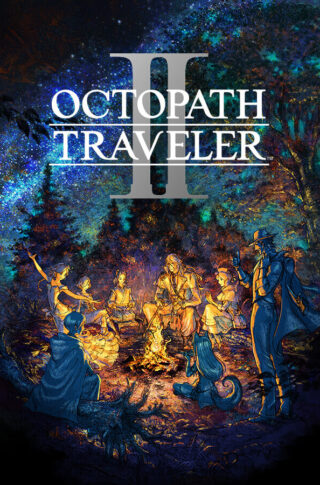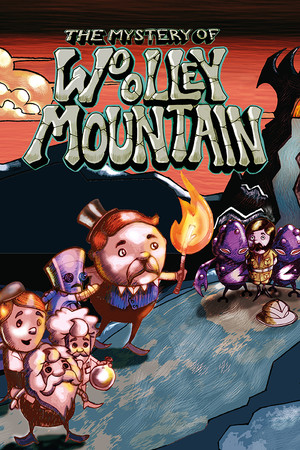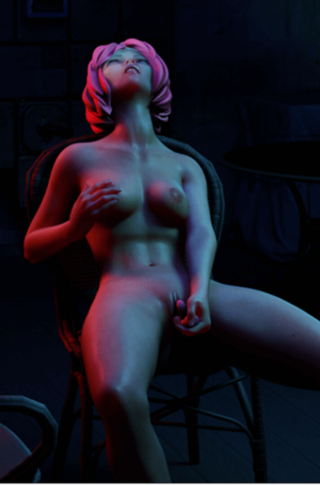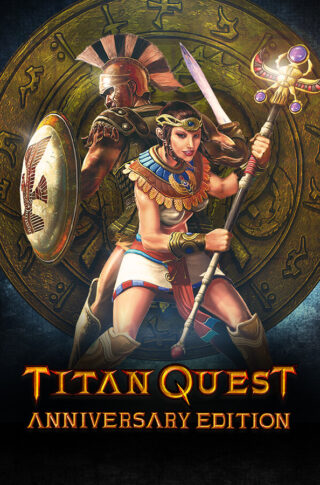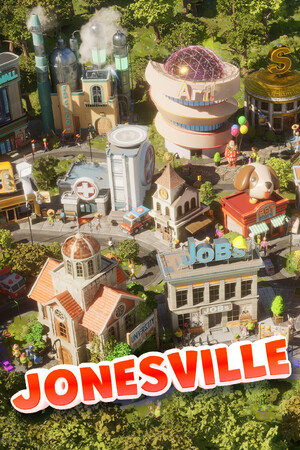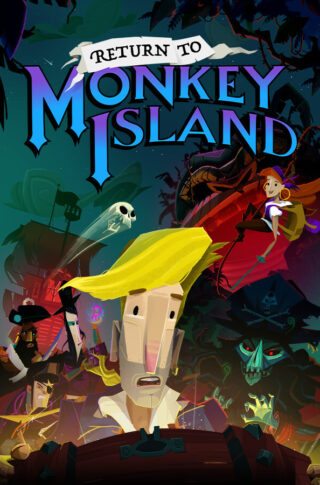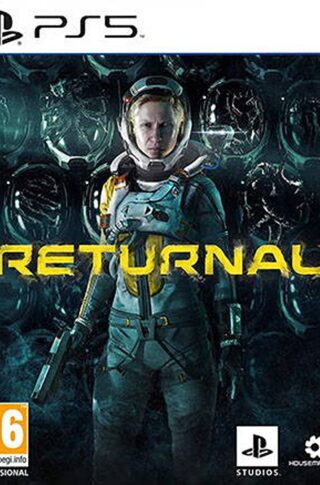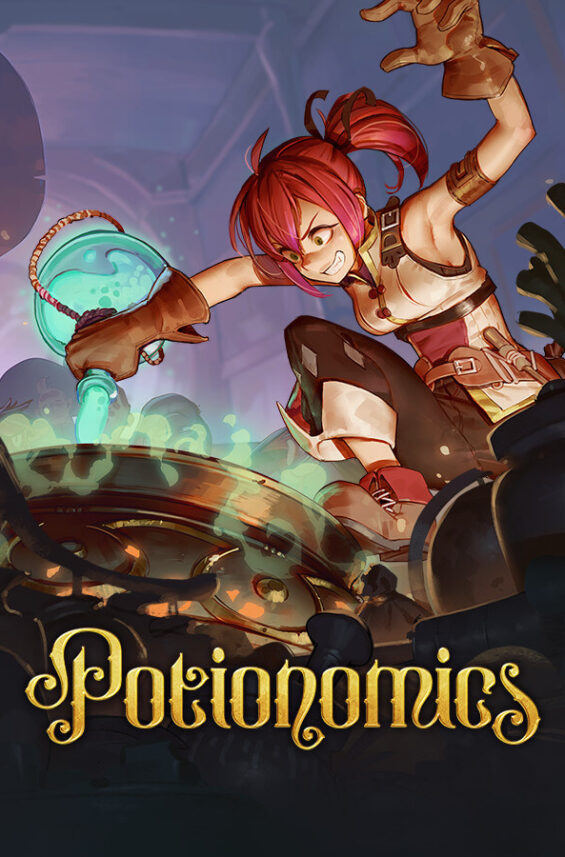
Potionomics Free Download
Potionomics Free Download Unfitgirl
Potionomics Free Download Unfitgirl Someone has to make all those potions that heroes quaff as they fight their way through dungeons, and in Potionomics, you’re that person. You play as Sylvia, who has inherited a debt-ridden potion shop from her uncle, and your job is to turn around its fortunes by brewing better and better potions, selling them for a profit and keeping on top of the repayments to stop the bank from repossessing your business. This isn’t the first time a game has tasked players with running a shop or brewing potions, but rarely has it been done with such gorgeous presentation and charm. The vibrant colour palette and fluid animations are a delight to behold, and the quirky characters are a joy to spend time with. Roxanne, your voluptuous and catty potion-making rival, is particularly fun, and she’s just one member of a colourful cast that also includes a rockstar bard cum hero, a cauldron-making walrus man and a chilled-out carpenter faun, among others. You can even date them if you build up enough rapport. Brewing potions is a complex process, as you might expect. Every ingredient contains a certain number of “magimins”, with more of them equating to a stronger brew. But magimins come in five types and you need the right balance to brew particular potions. In addition, some ingredients have positive or negative effects that can add to or detract from the value of the finished product. Unfitgirl.COM SEXY GAMES
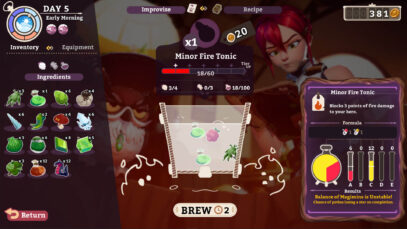
To source the ingredients, you’ll need to send out a member of the heroes’ guild on an expedition, and equip them with various potions to help them on their way – though the things they find might not necessarily be the things you need. But that’s only half the game: selling the potions involves haggling with customers to up the price, which you do with card battles. Developing relationships with other characters unlocks new cards, and tweaking your deck to discover more powerful card combinations is an involved and thoughtful process. Brewing, haggling, dating and gradually upgrading your shop are all thoroughly enjoyable pursuits, but the game is hobbled by an unnecessarily punitive structure that drains the fun from everything you do. Every 10 days there’s a potion competition you need to win to pay off the bank. Fail that and it’s game over, forcing you to reload an earlier save. The competition requires you to brew specific potions of a minimum quality, but just getting hold of the right ingredients can be arduous. Everything from going shopping to selling potions takes precious time, and the days leading up to the contest are filled with nervous panic as you desperately try to secure the necessary goods, knowing that failure will send you back hours. For such a cheerful-looking game, Potionomics has a remarkably cruel capitalist heart.
Your Shop, Your Rules
Enter Sylvia, heir to her uncle’s humble potion shop and massive debt to a bank. From this modest beginning, she has to convert Uncle Oswald’s shack into a small empire as she enlists adventurers equipped with her potions into the wilds in search of new ingredients and the help of several other denizens on this remote island. At the end of every ten days, a contest occurs with another local potion maker whose work is compared by dollar value with her potions. Win the competition, and a large sum of money goes to Sylvia and then immediately to the bank to pay a piece of the debt owed. At first, Sylvia meets only a few people who work with her—at a cost, of course. As Potionomics progresses, Sylvia meets more people who offer different talents to improve her business in various ways. While doing so, she can gift or spend time with each of these inhabitants in town to build her relationship with them. Aside from chatting and parading around town in these meaty asides, the friend will also teach Sylvia a technique in the form of a card that will help her sell her potions. Aside from brewing potions, the other primary focus of Potionomics is selling said potions. Every day offers six “time” that players can spend opening the shop for two points of time or going into town for one point of time. The potion’s base value depends on its potency and positive or negative qualities DOOM 3 Switch NSP
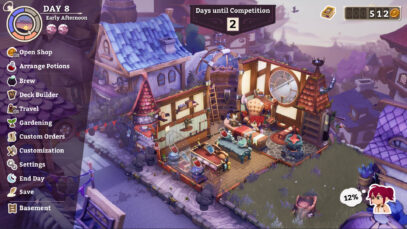
However, Sylvia is a haggling artist who uses cards in her twenty-card deck to brag about or convince the shopper into paying more than the base value. As a meter fills with “interest” points, thresholds are hit that will jack up the price by ten, fifteen, twenty, etc. percent, typically dependent on how much interest is needed to fill a gauge. Most consumers will have three or more bars to fill before they’re maxed out, which is not always easy. As this is a card-driven exercise, luck plays a role, and players have to know how to use what they’re dealt. The interactions with customers extend beyond simply applying interest points, though; customers will sometimes stress Sylvia out, raising the percentage chance of her drawing stress cards each turn that clog her hand and further add to her stress. Stress can have a runaway effect that can catch players by surprise. I often found myself with only a few percentage points of stress that cascaded into double digits quickly. Fortunately, Sylvia can combat this with stress reduction and shield cards that block stress after she ends her turn. Potionomics also has buffs, debuffs, and miscellaneous effects that can cater to various strategies depending on which friend players focus their time on in town. All of this is held together by customer “patience,” which is an ever-decreasing point value each time a card is played or Sylvia ends her turn.
Make better quality potions
When patience reaches zero, the customer leaves without buying the potion. Brewing potions involves a great deal of calculation, especially as the game extends beyond every ten days. Initially, players only have to brew things like health and mana potions, but then fire resistance potions and enhancement potions become available. Aside from being an avenue for profit when opening the shop, adventurers in town can be equipped with these potions to help them conquer dungeons out in the wild. This process is thoroughly planned out before adventurers go out, with players understanding all hurdles that the adventurer might run into, including monster health, elemental affinities, traps, and duration of the trek. To equip adventurers, players must mix and bottle the goods. Regardless, potion crafting can be a laborious process that takes quite a while if one wants to “perfect” every bottle. All because Potionomics insists on a ratio, that doesn’t mean players have to follow that exact ratio. Close enough can still produce a good potion, but extra stars are awarded if the ratio is perfect. Every potion upgrades in rating (e.g. greater, grand, superior, etc.) depending on how potent it is based on stars earned. This means a 75-point capacity beginner cauldron can only brew weaker potions suitable for the start of the game DOOM 64 Switch NSP
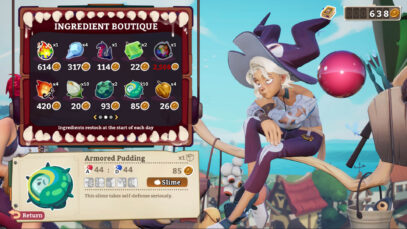
While later cauldrons can hold 400 or more magic points. So, if players want to successfully balance a 3:4:3 potion using 400 points with a large yet limited array of ingredients, making potion after potion with depleting resources will require some mathematical creativity. Players can shop in town and do a bunch of other tasks to expand ingredients in tow, but shops only offer 10 of one component at most every day, and those ingredients can cost a lot of money. In addition, some shops may only have four, two, or even one unit in stock of a given ingredient per day. To add complexity, ingredients can include different affinities to the five senses, either negatively or positively. As one might expect, positive traits increase the value of potions while negative traits diminish value; similarly, ingredients will cost more or less depending on their inherent qualities. Shops only have access to known ingredients, though. Sending adventurers out or investing in the guild hall can introduce new ingredients that the shop will then be able to sell. Adventuring can feel costly or foolish even, as adventurers require several potions and a fee to succeed, but this is a necessary task to find more and better ingredients. Players can also purchase cauldrons or shelf upgrades to allow for more substantial potions or to increase the value of potions on display.
You’ll get some pretty gross results
A woodworking friend can improve the shop by creating space for additional shelves and cauldrons, or offer fuel to decrease the time it takes for a potion to finish. Marketing specialists can make certain potions more profitable at the shop for a day or two. All of these systems flow intuitively well together and create one satisfying unit. For the first half of the game, I found Potionomics to be a surprisingly deep, complex, and rewarding experience. At around twenty or so hours, though, the surprises end and the grind begins. As the contests increase in difficulty, the demand for more upgrades requires more money, which requires new ingredients and more of that mathematically creative brewing. Initially, this was fun, but every day in the allotted ten-day window, I was brewing four or more cauldrons worth of potions three times, and the math became less and less interesting.You play as Sylvia, a witch fresh out of potion school who inherits her uncle’s shop and a mountain of debt along with it. Your goal is to raise enough money to pay off your 1 million gold debt before your shop is repossessed. Lucky for you, there’s an upcoming potion brewing contest with a grand prize of — you guessed it — 1 million gold. Along with your empty wallet, you face pressure from a ticking clock.
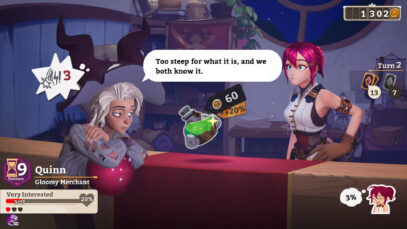
Each day in Potionomics is divided into six clock segments that deplete when you do almost anything. Potions also take time to brew, but you’re free to leave the cauldron running at home while you head out (not recommended in real life). You’ll spend most of your time making and selling potions, both of which have systems nearly deep enough to build an entire game around on their own. There are more than a dozen concoctions you can make, and each requires a precise balance of five elements called magimins. An early potion might take a 1:1 ratio of red to blue magimins, but recipes quickly get more complex, calling for more magimin types in more difficult-to-achieve combinations. It’s a satisfyingly complex puzzle that feels more like working out a formula than following a recipe. It’s never as simple as just mixing the eye of a newt with the toe of a frog and calling it a day. Potion-making gets more time-consuming as the game goes on, mostly because it takes so long to look through dozens of ingredients for your specific needs. That can make late-game brewing drag a bit, but the core puzzle never gets stale, and discovering the perfect mix after a long experimentation always feels like a job well done. With a shiny new potion in hand, you’ll need to open your shop and sell it.
Haggling plays out through a card game that’s similar to other deck-builders, but feels totally original. Each customer has a set amount of patience, which decreases when you play a card. To get a higher price for potions, you need to increase customers’ interest and close the deal before their patience runs out, all while mitigating stress that limits how many cards you can draw. It’s simple as far as card games go, but still strategic enough to deliver the thrill of a battle well fought. Cards you acquire later on open up entirely new playstyles as well, which keeps things plenty fresh. Before brewing or selling anything, you’ll need to gather potion ingredients. Potionomics’ setting Rafta has an adventure-based economy, so it’s packed with plucky heroes and monster-part merchants to supply you. And while Potionomics’ core mechanics would make it great on their own, my first journey into Rafta was where I realized how special of a game this really is. Rather than deal with faceless merchants and disposable heroes, you build your alchemical empire alongside a cast of engaging characters. There’s the buff walrus-man blacksmith, the chill dryad carpenter, the pair of pirate cats who are absolute relationship goals, and more. Every character has an expressive design with extremely impressive 3D animations. Downfall: A Story Of Corruption
Add-ons (DLC): Potionomics
| – | – | – | – | – | – |
| – | – | – | – | – | – |
| – | – | – | – | – | – |
| – | – | – | – | – | – |
OS: Windows 7
Processor: Intel Core 2 DUO 2.4 GHz / AMD Athlon X2 2.7 GHz
Memory: 8 GB RAM
Graphics: Nvidia GTX 650 Ti or AMD HD 7850
Storage: 7 GB available space
Requires a 64-bit processor and operating system
OS: Windows 10
Processor: Quad Core Processor
Memory: 16 GB RAM
Graphics: GeForce GTX 1060 6GB or Radeon RX 470
Storage: 7 GB available space
NOTE: THESE STEPS MAY VARY FROM GAME TO GAME AND DO NOT APPLY TO ALL GAMES
- Open the Start menu (Windows ‘flag’ button) in the bottom left corner of the screen.
- At the bottom of the Start menu, type Folder Options into the Search box, then press the Enter key.
- Click on the View tab at the top of the Folder Options window and check the option to Show hidden files and folders (in Windows 11, this option is called Show hidden files, folders, and drives).
- Click Apply then OK.
- Return to the Start menu and select Computer, then double click Local Disk (C:), and then open the Program Files folder. On some systems, this folder is called ‘Program Files(x86)’.
- In the Program Files folder, find and open the folder for your game.
- In the game’s folder, locate the executable (.exe) file for the game–this is a faded icon with the game’s title.
- Right-click on this file, select Properties, and then click the Compatibility tab at the top of the Properties window.
- Check the Run this program as an administrator box in the Privilege Level section. Click Apply then OK.
- Once complete, try opening the game again
NOTE: PLEASE DOWNLOAD THE LATEST VERSION OF YUZU EMULATOR FROM SOME GAMES YOU MAY NEED RYUJINX EMULATOR
- First you will need YUZU Emulator. Download it from either Unfitgirl, .. Open it in WinRar, 7ZIP idk and then move the contents in a folder and open the yuzu.exe.
- There click Emulation -> Configure -> System -> Profile Then press on Add and make a new profile, then close yuzu
Inside of yuzu click File -> Open yuzu folder. This will open the yuzu configuration folder inside of explorer. - Create a folder called “keys” and copy the key you got from here and paste it in the folder.
- For settings open yuzu up Emulation -> Configure -> Graphics, Select OpenGL and set it to Vulkan or OpenGL. (Vulkan seems to be a bit bad atm) Then go to Controls and press Single Player and set it to custom
- Then Press Configure and set Player 1 to Pro Controller if you have a controller/keyboard and to Joycons if Joycons. Press Configure and press the exact buttons on your controller After you’re done press Okay and continue to the next step.
- Download any ROM you want from Unfitgirl, .. After you got your File (can be .xci or .nsp) create a folder somewhere on your PC and in that folder create another folder for your game.
- After that double-click into yuzu and select the folder you put your game folder in.
- Lastly double click on the game and enjoy it.

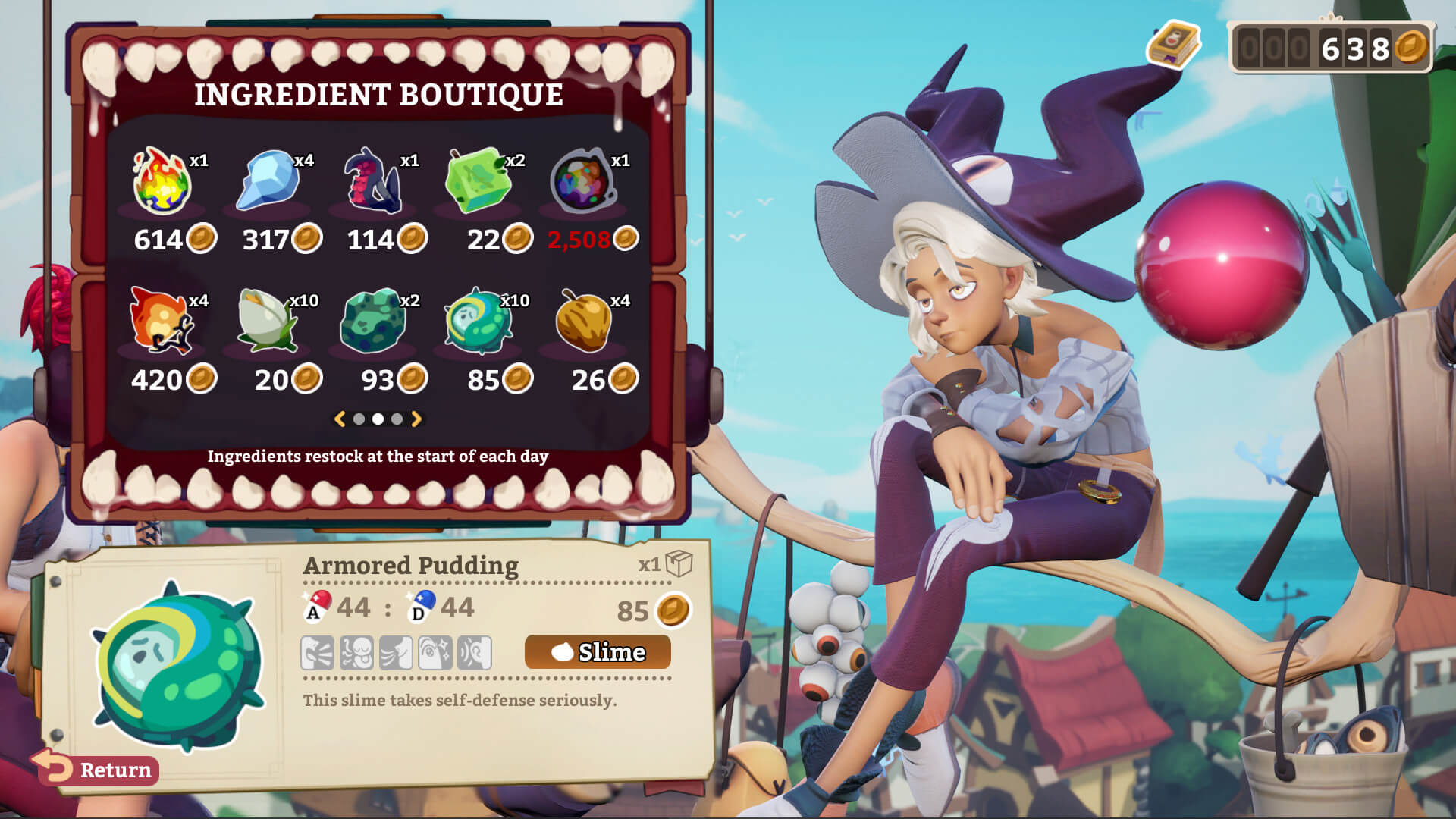
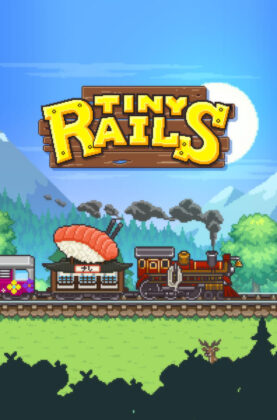





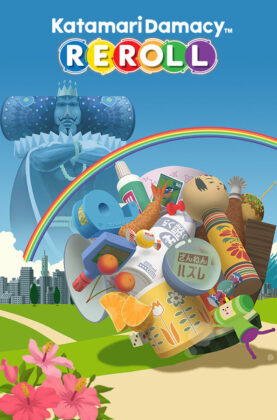

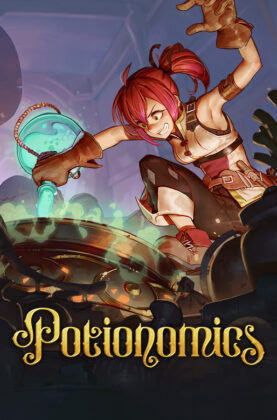



![Ataegina [Kthulian] UNCENSORED Free Download Unfitgirl](https://gopcgames.com/wp-content/uploads/2022/08/Ataegina-Kthulian-UNCENSORED-Free-Download-Unfitgirl-1-320x485.png)



